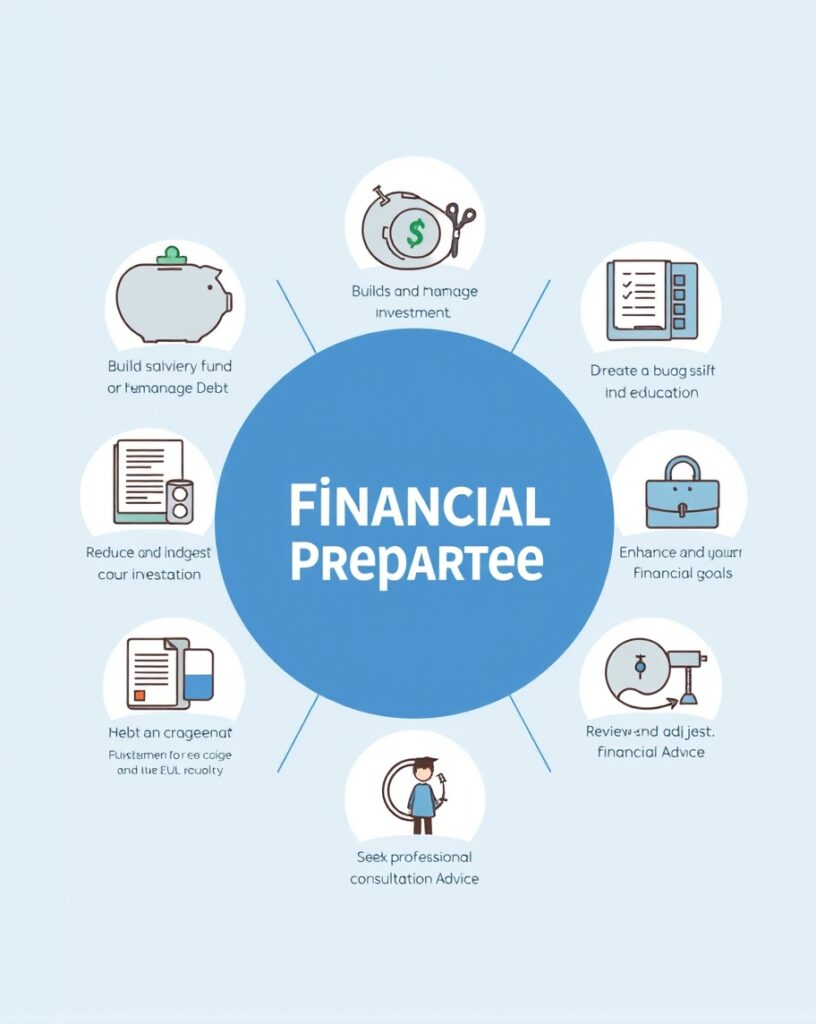In times of economic uncertainty, being financially prepared can make all the difference between weathering the storm and facing significant financial hardships. Economic downturns can impact employment, investments, and overall financial stability. Preparing in advance can help mitigate these effects and ensure that you’re well-positioned to handle the challenges that arise. Here’s a comprehensive guide on how to financially prepare for an economic downturn with actionable strategies and expert tips.
Understanding the Impact of an Economic Downturn
An economic downturn, also known as a recession, is characterized by a decline in economic activity that lasts for an extended period. During this time, businesses may struggle, unemployment rates can rise, and financial markets might experience volatility. Key impacts include:
- Job Losses: Higher unemployment rates can lead to job losses or reduced income.
- Investment Volatility: Stock market declines can affect investment portfolios.
- Reduced Consumer Spending: Decreased consumer confidence can lead to reduced spending and investment.
Tips for Financially Preparing for an Economic Downturn
1. Build an Emergency Fund
Why It’s Essential: An emergency fund acts as a financial cushion in case of unexpected expenses or loss of income. It ensures that you have liquid assets available to cover essential expenses during tough times.
How to Do It:
- Set a Target Amount: Aim to save three to six months’ worth of living expenses.
- Open a Separate Account: Keep your emergency fund in a high-yield savings account or a money market account for easy access and growth.
- Automate Savings: Set up automatic transfers to your emergency fund to ensure consistent contributions.
2. Reduce and Manage Debt
Why It’s Important: High levels of debt can become unmanageable during economic downturns, particularly if your income is affected. Reducing debt minimizes financial strain and improves your overall financial stability.
How to Do It:
- Create a Debt Repayment Plan: Focus on paying off high-interest debts first, such as credit card balances.
- Consolidate Debt: Consider consolidating high-interest debts into a lower-interest loan to simplify payments and reduce interest.
- Avoid New Debt: Refrain from taking on new debt, especially during uncertain times.
3. Diversify Your Investments
Why It’s Crucial: Diversification helps spread risk across different asset classes, reducing the impact of market volatility on your investment portfolio.
How to Do It:
- Review Your Portfolio: Assess your current investments and ensure a mix of stocks, bonds, and other assets.
- Consider Defensive Stocks: Invest in companies that tend to perform well during economic downturns, such as utilities or consumer staples.
- Explore Alternative Investments: Look into assets like real estate or precious metals that may provide stability during market fluctuations.
4. Create a Budget and Stick to It
Why It’s Necessary: A well-planned budget helps you manage your finances effectively, ensuring that you live within your means and prioritize essential expenses.
How to Do It:
- Track Your Income and Expenses: Use budgeting apps or spreadsheets to monitor your financial activity.
- Identify Areas for Reduction: Cut non-essential spending and focus on necessities.
- Adjust as Needed: Be flexible and adjust your budget based on changes in your financial situation.
5. Enhance Your Skills and Education
Why It’s Beneficial: Investing in your skills and education can improve your job security and increase your employability, making you more resilient to economic shifts.
How to Do It:
- Pursue Professional Development: Enroll in courses or certifications relevant to your field.
- Expand Your Network: Build professional connections and attend industry events to stay informed about job opportunities.
- Explore New Career Paths: Consider training for roles in industries that are more stable or in demand during downturns.
6. Review and Adjust Your Financial Goals
Why It’s Important: Economic downturns may require a reassessment of your financial goals and timelines to ensure they remain realistic and achievable.
How to Do It:
- Reevaluate Your Goals: Adjust your financial goals based on current economic conditions and personal circumstances.
- Update Your Plan: Modify your savings and investment strategies to align with your revised goals.
- Stay Flexible: Be prepared to make further adjustments as the economic situation evolves.
7. Seek Professional Financial Advice
Why It’s Useful: A financial advisor can provide personalized guidance and strategies tailored to your specific financial situation, helping you navigate economic uncertainty.
How to Do It:
- Find a Reputable Advisor: Look for a certified financial planner or advisor with a strong track record.
- Discuss Your Concerns: Share your financial situation and concerns to receive targeted advice.
- Review Regularly: Schedule regular check-ins to adjust your plan based on changes in the economy or your personal circumstances.
